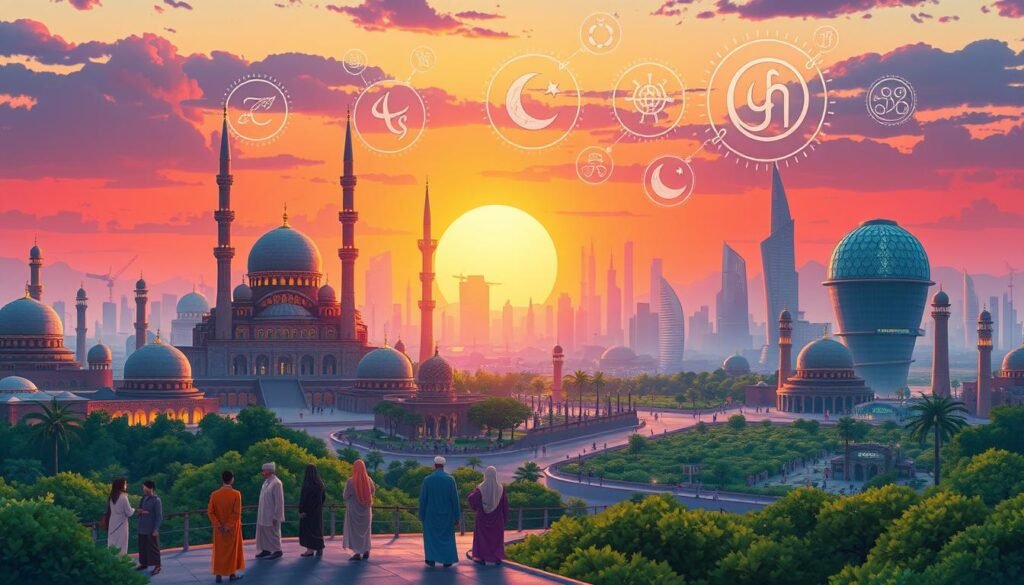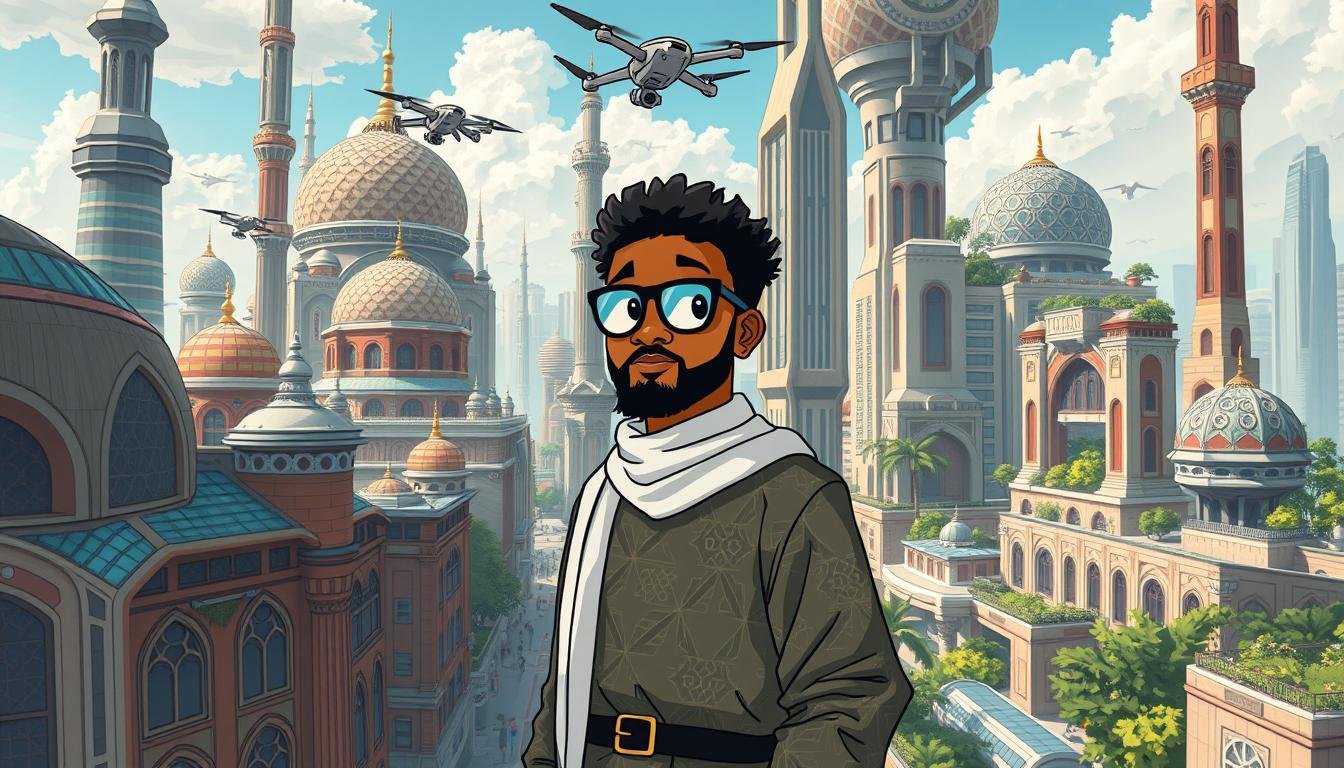What if hip-hop’s biggest stars are exploring faith in a new way? Nayvadius DeMun Wilburn, or rapper Future, has won fans with his music. But, rumors say he might be Muslim. This makes us wonder about his beliefs and the role of Islam in hip hop.
We will look into Future’s spiritual path. We’ll see how it connects with the Muslim world. This journey could change how we see faith in music.
Overview of Future’s Background
Nayvadius Wilburn, known as Future, came from Atlanta, Georgia. He quickly became a big name in Atlanta rap. His music career started in 2011 with Rocko’s A1 Recordings.
Future changed trap music with auto-tune. His albums like “Pluto” and “Hndrxx” were huge hits. They also changed hip-hop forever.
Future’s music mixes Southern hip-hop with new sounds. His songs talk about hard times, winning, and growing. His stories connect with many fans. Looking at Future’s life shows how Atlanta shaped him into a key artist in music.
Future’s Early Life and Career Trajectory
Future grew up in tough Atlanta neighborhoods. His tough start shaped his creativity and music. He started his music career in the 2000s, calling himself “Meathead.”
He was part of the Dungeon Family collective. This group was key in the Atlanta music scene. It helped him grow as an artist.
Future released early mixtapes that caught people’s attention. The Atlanta music scene helped him a lot. It gave him chances to work with local artists.
His big hits like “Tony Montana” and “Turn On the Lights” made him famous. They showed his unique style to fans.
Future faced big challenges, like a shooting at 16. But he didn’t give up. He kept going, driven by his music.
His story shows how music can change lives. It has made a big impact on hip-hop culture.
Future’s journey shows how important his roots are. He changed the Atlanta music scene and more. For more on artists and culture, check out this exploration of hip-hop.
Is Future Muslim?
The talk about Future’s faith has really caught the attention of hip-hop fans. People are guessing if Future is a Muslim. They look closely at his lyrics for clues about his beliefs. Others believe in rumors about his faith that spread online.
This situation shows a complex mix. In hip-hop, it’s hard to tell what a star really believes. It makes their spiritual side hard to see.
The Rumors and Speculations
Many wonder: Is Future Muslim? The media often changes how we see stars, hiding their true beliefs. Fans see spiritual themes in his songs, sparking talks about his faith. Some songs seem to touch on Islamic ideas, making people think more.
These talks also bring up big issues in entertainment and the Muslim community.
Future’s Own Statements
Future rarely talks about his faith, keeping it a mystery. He doesn’t say if he’s religious, leaving fans to guess. This mystery is common in the music world.
It makes fans keep asking about Future’s spiritual side. It shows we need to talk more about Future’s beliefs.

Discussion on Religion in Hip Hop
Religion in hip hop is very important. It gives a special view on the stories in the genre. Artists share their spiritual journeys, mixing their life stories with their music.
Dr. Roy Whitaker from San Diego State University says Black music, including hip hop, comes from many religions. Christian rap started when African Americans needed hope and redemption. It mixed Gospel with hip-hop, growing in tough times.
Islam also has a big role in hip hop, making it more diverse. The talk about faith in rap music includes being true, fighting for rights, and the struggles of Muslim artists. Some Muslims think music is okay, while others don’t.
Muslim hip-hop artists face criticism from their communities. They try to keep their art and faith in balance. They talk about justice, equality, and personal battles in their songs.
Notable Muslim Figures in Hip Hop
Hip-hop is full of stories, and Muslim rappers add to its richness. They mix faith and art, showing in both new and old talents. Artists like Ice Cube, Jay Electronica, and Lupe Fiasco blend their beliefs with music. This creates a sound that many people enjoy.
These musicians share their faith through songs. They also inspire others to be proud of who they are.
Emerging Artists Influenced by Islam
New artists are making a mark, thanks to their Islamic roots. Kevin Gates uses Arabic in his songs, showing his faith. Lil Durk prays in his song “Pelle Coat,” showing his journey of seeking forgiveness.
French Montana celebrates his Moroccan heritage and Islam. These artists show how Islam can add depth to hip-hop.
The Impact of Muslim Rappers on the Genre
Muslim rappers do more than just make music. They help hip-hop accept different cultures. Pioneers like Busta Rhymes, who became Muslim early, opened doors for others.
They talk about identity and spirituality in music. As Muslim artists grow, they tackle big issues and highlight community struggles. Jay Electronica, linked to the Nation of Islam, works with big names, bringing cultures together.
These artists change hip-hop, showing it can be about faith, culture, and talking. The story of Islam in hip-hop keeps growing
Future’s Musical Influence and Style
Future’s music stands out in today’s hip hop scene. It’s shaped by trap music’s spiritual side. This style lets artists explore deep emotions and spiritual ideas. It creates a future music style that many people love.
His songs often mix material goals with deep thoughts. This makes listeners think about their own lives. It’s a way to see the world differently.
Use of Spiritual Themes in His Lyrics
Songs like “Life Is Good” and “Mask Off” show this mix. They talk about wanting things in life but also seeking something deeper. Future’s use of auto-tune adds a special touch to his songs.
His music touches on big topics, not just fun stuff. It makes us think about our fast-paced world. Every song is like a mirror for us to see ourselves.

Future’s music is both close to home and makes us think. His future music style lets us connect with spiritual ideas. It makes us think about our lives and the world we live in.
His music is a powerful way to share thoughts and feelings. It shows how hip hop can be a powerful tool for self-expression.
If you want more inspiration, check out Future’s quotes. They talk about staying strong and looking inside yourself when things get tough.
Public Perception and Media Representation
The way artists are shown in media affects how people see rappers. It shapes what we believe about their lives. When media shows different sides of artists, it helps fight stereotypes.
For example, Muslims make up 25% of the world’s people but only 1.1% of TV characters. This imbalance can lead to wrong ideas and strengthen old biases.
Looking at the numbers, it’s clear there’s a problem. Over 30% of Muslim characters in shows are shown doing violence. Almost 40% are victims of violence. These images can create false beliefs that harm society.
Riz Ahmed wants to see more variety in Muslim roles. He hopes for stories that show a range of experiences, not just simple labels.
Media’s impact goes beyond just characters. The Pillars Fund wants to show Muslims in a more detailed way. Shows like Miss Marvel are steps in the right direction, but negative images still stick in our minds.
Media often makes Muslim identities seem the same, lacking real depth. Shows like Homeland use Muslim characters in violent stories. This not only affects how we see rappers like Future but also shapes broader beliefs with serious effects.
Future’s Potential Influence on Muslim Youth
Future’s music speaks to a generation dealing with identity and cultural pressures. Almost 80% of Muslim youth feel the need to be perfect ambassadors of Islam. The Future influence on youth can be empowering. His success in a non-Muslim industry brings visibility to Muslim representation in hip hop.
I think Future’s voice can be a key role model for Muslim youth. They look for ways to blend their faith with modern culture. His songs often address complex issues faced by young Muslims, like bullying and cultural expectations.
His music can also inspire Muslim youth to be proud of who they are. It encourages them to delve deeper into their faith. In a world where they often face identity crises or bullying, Future’s influence can be a bridge.
As artists like Future become more known, Muslim representation in hip hop will grow. His impact on young Muslims shows the need for diverse role models. These models help young people feel proud of their backgrounds.
Final Thoughts on Future and the Muslim Community
The debate about Future’s relationship with the Muslim community is big. It’s not just about his faith. It’s about how artists show who they are and what they believe.
Thinking about this, I see how important family and community ties are. They help us understand and respect each other’s differences. This is how we bridge gaps between cultures.
Artists like Future have a big impact on how we see ourselves. Their stories can change how we think about our own identities.
Representation is more than just one artist. It’s about the many stories from the Muslim community. Hip-hop is a place where they can share their faith and culture.
We need to support artists and their communities. This lets them share their stories and keep their traditions alive. It’s a chance for Muslims to be seen and heard in music.
Looking at Future’s story, we see a chance to think about our role in telling stories. We can help by being kind and respectful. This is especially important as Islam grows.
By talking and being open, we can break down stereotypes. We can celebrate the art of those who are often ignored. This way, we can all grow together in a diverse world.
FAQ
Is Future a practicing Muslim?
How has Future’s background influenced his music?
What role do spiritual themes play in Future’s music?
How do media representations affect public perception of Future?
What is the significance of Muslim representation in hip-hop?
How might Future influence Muslim youth?
What are the implications of Future’s ambiguous faith on the Muslim community?

Embracing Faith, One Insight at a Time!
The teachings of the Quran have always guided my path. With a deep passion for Islamic knowledge, I strive to blend the wisdom of tradition with the relevance of today, making the timeless messages of Islam accessible and meaningful for everyone.
Muslim Culture Hub is my platform to share historical insights and thought-provoking articles, exploring both well-known and lesser-discussed aspects of Islamic culture and beliefs. My mission is to create an inclusive online space where everyone can learn, strengthen their faith, and connect with the profound message of Islam.
Join the journey!
May peace be upon you.








